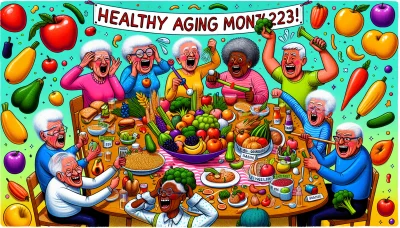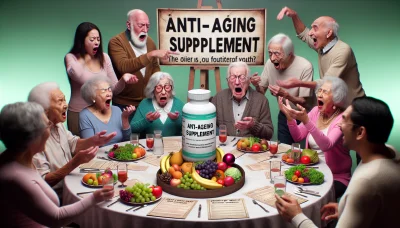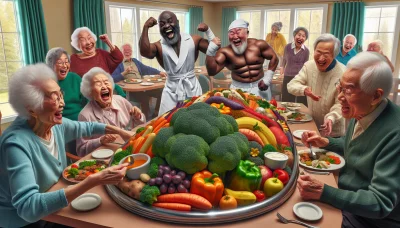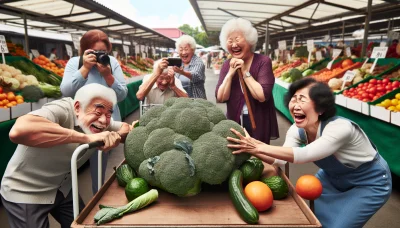Vitamins for seniors over 70 Quiz
Test Your Knowledge
Question of
Essential Vitamins for Seniors Over 70
Understanding Nutritional Needs After 70
- Age-Related Changes in Absorption
- Adjusting Dietary Intake for Optimal Health
Key Vitamins and Their Benefits
- Vitamin D for Bone Health
- Vitamin B12 for Nerve Function and Energy
Tailoring Diets to Support Healthy Aging
The Role of Antioxidants in Senior Diets
Foods Rich in Vitamin C and E
Vitamin C and E are crucial antioxidants that help protect cells from damage, support immune function, and promote skin health. Foods high in Vitamin C include oranges, strawberries, bell peppers, and broccoli, while Vitamin E can be found in nuts, seeds, spinach, and avocados.
The Importance of Beta-Carotene and Selenium
Beta-carotene, a precursor to vitamin A, and selenium are important for maintaining eye health and supporting the immune system. Carrots, sweet potatoes, and leafy greens are rich in beta-carotene, whereas selenium can be found in Brazil nuts, fish, and eggs.
Balancing Macronutrients for Energy and Muscle Maintenance
Protein Needs for Seniors
Protein is essential for maintaining muscle mass, repairing tissues, and supporting immune health. Seniors should aim for a diet that includes lean meats, dairy, beans, and lentils to meet their protein needs.
Carbohydrates and Fats: Getting the Right Mix
Carbohydrates are the body's main source of energy, while fats provide essential fatty acids and help absorb vitamins. Seniors should focus on whole grains, fruits, and vegetables for carbohydrates and include healthy fats from sources like olive oil, nuts, and fish.
Addressing Common Deficiencies in Seniors
Calcium and Vitamin D: Preventing Osteoporosis
- Dairy and Plant-Based Sources of Calcium
- Sunlight Exposure and Vitamin D Supplementation
Iron and Vitamin B12: Combating Anemia
- Iron-Rich Foods and Absorption Tips
- The Necessity of B12 Supplements for Vegans and Vegetarians
Dietary Adjustments for Specific Health Concerns
Managing Blood Pressure with Potassium and Magnesium
Natural Sources of Heart-Healthy Minerals
Heart-healthy minerals such as potassium and magnesium can be found in a variety of foods. Bananas, spinach, and avocados are rich in potassium, while magnesium can be sourced from nuts, seeds, and whole grains. Integrating these foods into your diet can help manage blood pressure levels effectively.
The Impact of Sodium Reduction on Hypertension
Reducing sodium intake is crucial for managing hypertension. High sodium levels can cause water retention, leading to increased blood pressure. Opting for fresh foods over processed foods, and seasoning with herbs and spices instead of salt, can significantly reduce your sodium intake and help manage blood pressure.
Cognitive Function and Brain Health Nutrients
Omega-3 Fatty Acids and Their Sources
Omega-3 fatty acids are essential for brain health, supporting cognitive function and reducing the risk of neurodegenerative diseases. Fatty fish like salmon, mackerel, and sardines are excellent sources of omega-3s. For vegetarians, flaxseeds, chia seeds, and walnuts are good alternatives.
Incorporating Folate and Vitamin E in Meals
Folate and Vitamin E are vital nutrients for brain health. Leafy greens, legumes, and fortified foods are great sources of folate, which supports brain function. Vitamin E, an antioxidant that protects cells from oxidative stress, can be found in nuts, seeds, and green leafy vegetables. Including these nutrients in your diet can aid in maintaining cognitive function and brain health.
Hydration and Electrolyte Balance in the Elderly
Importance of Hydration for Seniors
Hydration is crucial for seniors, as it supports overall health, including kidney function, digestion, and brain function. Proper hydration helps to prevent urinary tract infections, constipation, and confusion.
Recognizing Dehydration Symptoms
Dehydration in the elderly can be identified by symptoms such as dry mouth, fatigue, dizziness, and less frequent urination. It's important to recognize these signs early to prevent further health complications.
Strategies to Increase Fluid Intake
To increase fluid intake, seniors can try setting regular drink reminders, consuming water-rich foods like fruits and vegetables, and keeping a water bottle within easy reach.
Maintaining Electrolyte Levels with Age
Electrolytes, such as potassium, magnesium, and sodium, are vital for muscle function, hydration, and nerve signaling. Maintaining balanced electrolyte levels is essential for preventing complications like muscle weakness and heart rhythm disturbances.
Foods High in Potassium, Magnesium, and Sodium
To maintain electrolyte levels, seniors can include foods like bananas, spinach, potatoes, nuts, and beans in their diet, which are high in potassium and magnesium. For sodium, a balanced intake through regular meals is generally sufficient.
When to Consider Electrolyte Supplements
Electrolyte supplements may be necessary for some seniors, especially those with chronic conditions or those experiencing prolonged periods of vomiting or diarrhea. However, it's important to consult a healthcare provider before starting any supplement regimen.
Practical Meal Planning for Seniors Over 70
Creating a Weekly Nutrient-Dense Menu
Planning a weekly menu that is both nutrient-dense and appealing can help seniors maintain a balanced diet. A well-thought-out menu can cater to specific dietary needs while ensuring that meals are enjoyable and diverse.
Sample Menus That Cover Dietary Needs
Sample menus for seniors might include a variety of fruits, vegetables, lean proteins, and whole grains. For example, a day's meals could consist of oatmeal with berries for breakfast, a quinoa and vegetable salad for lunch, and baked salmon with steamed broccoli and sweet potatoes for dinner.
Tips for Meal Prepping and Grocery Shopping
Meal prepping can save time and ensure that healthy options are always available. Seniors should focus on buying fresh produce, lean proteins, and low-sodium options. Preparing and freezing meals in portions can also help manage meal sizes and reduce waste.
Overcoming Challenges: Appetite and Taste Changes
Changes in appetite and taste can make eating less enjoyable for seniors. However, there are ways to enhance meals without relying on excess salt or sugar.
Enhancing Flavor Without Excess Salt or Sugar
Using herbs, spices, and citrus can add flavor to meals without the need for additional salt or sugar. Experimenting with different seasonings can help find new favorite flavors.
Solutions for Reduced Appetite and Eating Difficulties
For seniors facing reduced appetite or eating difficulties, smaller, more frequent meals can be beneficial. Smoothies and soups can also provide necessary nutrients in an easy-to-consume format. Ensuring meals are visually appealing and eaten in a pleasant, social setting can also encourage eating.












